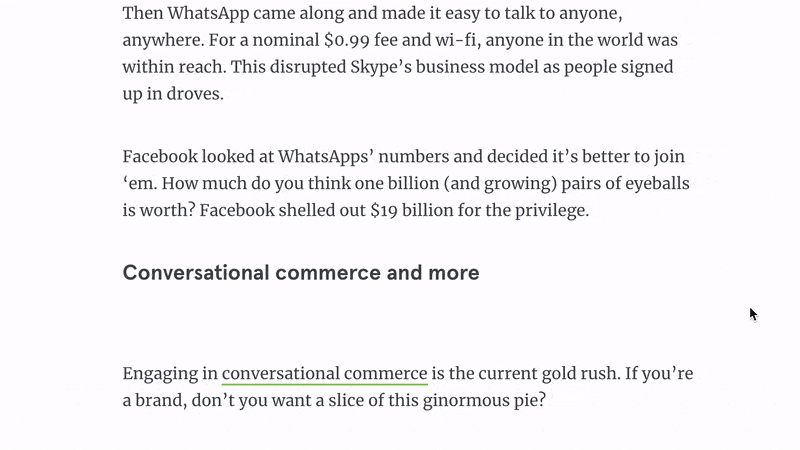Tips
5 landing page tests to run on your website from day one
You’ve got visitors, and now you need to turn them into customers. It start with knowing their needs. Here’s five tests you should be running on your landing pages.<br>

Remember the motto “Always be selling?” In the digital world, that means “Always be testing.”
Test your features, test your copy, and test the media on your website. Test it all. Because frequent testing lets you figure out what works for your visitors—and what’s going to lead them to that longer-term relationship.
But what do you test? When do you test? And how do you test?
The golden rule: focus on your landing pages. They’re your potential customers’ first interaction with your brand. And you need to make that first impression count.
Here’s how to test your landing pages to make sure you’re connecting, and converting, your audience.
1. Headlines as a first impression
Your headline is probably the first thing your visitor sees. This makes it an uber-critical element of your landing page. It’s also your first test for improving the journey from visitor to customer.
So give your headline the headspace it deserves. Here’s Brian Jackson from Kinsta:
Writing the right headline can be tricky. Especially since your visitors are different. But they’ll be united by a problem they’re trying to solve. And that’s why they’ve come to you—to find a solution.
Here are some suggestions on the types of headlines you should be testing, inspired by Kinsta:
- Command headlines. “Act now or lose this discount forever!” Bold and actionable wording. This headline tells the visitor what to do. Start with a verb and be a little dramatic.
- Direct headlines. “Engagement Rings 50% Off.” Straightforward wording with no attempt to be clever.
- Question headlines. “Are you ready to take on the great outdoors?” Um, exactly what it sounds like. Pose your headline as a question.
- Problem-solving headlines. “Are you also sick of food sticking to your pans?” Make an emotional appeal to your audience while making your business feel relevant.
- Instructional & how-to headlines. “Add code SPRINGFLING at checkout to get 30% off.” Help the reader out. Give them an instructional headline to help them complete the intended action.
2. People want video
When video and text are both available on a page, 72% of people would rather watch a video to learn about a brand or product. And according to Hubspot:
- 80% of marketers say they’ve seen an increase in dwell time on their site after adding video.
- 95% of consumers have watched an explainer video to learn more about a product or service.
- 81% of people were convinced to buy a product or service by watching a brand’s video.
That’s lots of positive percentages. And as prices go down and quality goes up, video will continue to gain ground on other content formats.
So use it, and more importantly, test it. But keep these best practices in mind:
- Show, don’t tell. Let your product speak for itself. Use a model of your product with a voiceover.
- Let your customers talk on your behalf. Turn one of your best testimonials into a landing page video.
- Test timing to learn when visitors drop off. Try hosting your video on YouTube to get access to watch-time analytics.
- Keep your video above the fold, along with your CTA. This prompts customers to watch, then buy.
3. Add a conversational form
People crave authenticity. Guess what: customers are people too. But how can you make a landing page feel genuine?
Use a conversational user interface (CUI) by adding a form or a bot to your page. This will engage your audience way better than any static Graphical User Interface (GUI).
Here’s Eliz Kiliç from Prototypr.io:
An interactive experience allows you to be more personal. And it gives you a chance to sell more directly without sounds like a sales pitch. Try embedding a CUI into text, just like you would any other opt-in, subscribe, or contact form.
Or why not invite someone to subscribe to your newsletter using a chat, rather than an overwashed form that simply says “Subscribe.”
Alright, that’s all nice and cozy. But how do you test this type of interaction to see whether it converts?
First, test the type of interaction—CUI versus a standard form, or versus some other interactive style element. Then try testing its location and CTA, one at a time. Do this and you’ll slowly develop a blueprint for your brand’s most effective website forms.
4. Make space for a secondary CTA
A strong call-to-action is important. But how about a secondary CTA? How does it fit into the testing and conversion quandary?
Your secondary CTA is meant to catch potential customers who don’t convert on the first try.
Take a subscribe CTA for instance. It can make a perfect secondary CTA whenever a visitor has shown interest in your brand or products but not pulled out their wallet. Once they subscribe, you can nurture them until they complete a purchase down the road.
So how do you test this second button to the prolific primary CTA? Well, depending on your goal, first check which action is most engaging or effective on your page. For example, say you’re looking to drive subscribers. Try testing your:
- standard subscriber form
- opt-in for subscribing
- white paper download
- freebie or value-add download
- inexpensive digital download
But when testing these formats, be sure to keep all details the same. The look of your button, the style of your page, and the feel of your form must be consistent or you’ll skew your results. Only test one element at a time.
Yes, this type of testing can be extensive. To ease the process, use an A/B testing tool to keep track of variations and results.
5. Infomercials still work
Infomercial landing pages are long—really long—and they’re all about the offer. They include multiple CTAs which often have the same intended action. These can be testimonials, videos, images, and call-out quotes. So what’s the key? Your persuasive copy.
Instead of talking about the product and its features, try appealing to problems and solutions. This makes the sell more emotional.
CopyBloggers suggests these infomercial techniques:
- Sprinkle in testimonials and case studies of your product to provide value to the customer. Show how your brand is solving their problem.
- Agitate the problem using this sales copy formula: Problem-Agitate-Solve.
- Use repetition. Infomercials hammer a message home on repeat. Your job is to find new angles to frame the same thing over and over.
- Make it scarce so the reader feels they need to act right away.
- Tell the visitor exactly what to do. Keep every CTA crystal clear.
When it comes time to see what’s working, either test this page against one of your standard landing pages, or create two variations of your infomercial page and test them head-to-head.
Never Stop Testing
Remember that testing is a continuous commitment to seeing what connects best with your audience. It’s a process that demands dedication, creativity, and the willingness to fail.
It’s how you learn what drives conversions and what falls flat. Use these ideas to start testing your assumptions—so when potential customers hit your landing page, they get where you want them to go.





.png)

